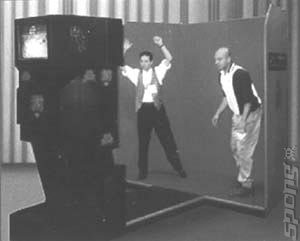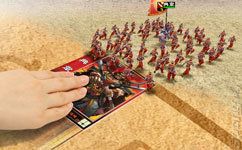Features// Arcade Report - May 2007
Guitar Freaksbasks in the glow of knowing it fathered GuitarHero
Innovative video amusement is a cornerstone of the sector’s survival as audiences have become transient. The number of innovative arcade interfaces and methodologies that have been later borrowed by consumer adaptation is a testament to a greater synergy between home gaming and amusement.
Name a genre and arcade had done it first (all but MMORP and MUD games); from sports to drivers, shooters to beat-em-up the ground rules were drawn up in the darkened corners of an arcade. The popularity of Retro gaming is not only a testament to player nostalgia, but also to the playability of original content - still immersed in what Nolan Bushnell referred to as "easy to player - hard to master" playability that only arcade can do fueled by the impetus of Pay-for-Play demographics.
Konami Digital Entertainment took the concept of player motion capture (MoCap) and brought it first to the amusement audience, creating a number of revolutionary arcade titles - that this concept would be surprisingly similar to what would come from Nintendo as the Wii and what they would call unique is another matter. Previous to this, Konami would present a MoCap gun game with Police 911 (2001). Physicality translated into the video game environment. Supported titles also included sword fighting game Blade of Honor (2001), and duellist title Mocap Boxing (2001).
The physicality achieved by Konami would prove inspirational in its wholly inspired amusement genre of BeatMani (music or beat orientated game-play). First seen in Dance Dance Revolution (1998), which has fathered a number of consumer music games that borrow directly from Konami's implementation of the genre is vast. While Konami's Guitar Freaks basks in the glow of knowing it fathered GuitarHero, if not indirectly.
Physicality has been a big element in amusement with products such as SEGA’s very physical screen-hitting game most recently represented with Touch De Zuno and the newly released Manic Panic Ghost games. Previously it was SEGA's extensive graphic hardware investment for amusement that would tumble the price of hardware and allow the DreamCast and PlayStation to be reasonably priced 3D textured graphics monsters and console successes.
The video camera player movement device would create games such as JesterTek who created the JestXtreme (2001) gesture-controlled game system. When this idea was turned into the PlayStation 2 EyeToy later, we would see Jestertek agree terms with Sony.
The new PlayStation Toy for the PS3 uses CyberCode so that image recognition can interface the viewed card into the onscreen experience – the first game for this consumer technology, is Eye of Judgment. But this new technology is not so original. The concept builds on the popular genre that has hit the Japanese and European amusement sector. Games such as SEGA’s World Club Champion Football (2002) and Sangokushi Taisen (2005) enable players to place collected cards on a table, with the machine recognising the cards and their movement and represented within the game live.
The coverage of this invocative sector of the industry will continue in the next of this month’s coverage – The amusement feature now moving to a fortnightly setting.
About the author: Kevin Williams is founder and director of the out-of-home leisure entertainment consultancy KWP Limited. His extensive years in the global video amusement and hi-tech attractions industry includes top management and design posts, with special focus on new technology development and applications. A well-known speaker on the industry and its technology, he pens an extensive number of articles. Founder and publisher of The Stinger Report - a popular industry e-Newsletter and web-based information service.

Name a genre and arcade had done it first (all but MMORP and MUD games); from sports to drivers, shooters to beat-em-up the ground rules were drawn up in the darkened corners of an arcade. The popularity of Retro gaming is not only a testament to player nostalgia, but also to the playability of original content - still immersed in what Nolan Bushnell referred to as "easy to player - hard to master" playability that only arcade can do fueled by the impetus of Pay-for-Play demographics.
Konami Digital Entertainment took the concept of player motion capture (MoCap) and brought it first to the amusement audience, creating a number of revolutionary arcade titles - that this concept would be surprisingly similar to what would come from Nintendo as the Wii and what they would call unique is another matter. Previous to this, Konami would present a MoCap gun game with Police 911 (2001). Physicality translated into the video game environment. Supported titles also included sword fighting game Blade of Honor (2001), and duellist title Mocap Boxing (2001).
The physicality achieved by Konami would prove inspirational in its wholly inspired amusement genre of BeatMani (music or beat orientated game-play). First seen in Dance Dance Revolution (1998), which has fathered a number of consumer music games that borrow directly from Konami's implementation of the genre is vast. While Konami's Guitar Freaks basks in the glow of knowing it fathered GuitarHero, if not indirectly.
Physicality has been a big element in amusement with products such as SEGA’s very physical screen-hitting game most recently represented with Touch De Zuno and the newly released Manic Panic Ghost games. Previously it was SEGA's extensive graphic hardware investment for amusement that would tumble the price of hardware and allow the DreamCast and PlayStation to be reasonably priced 3D textured graphics monsters and console successes.
The video camera player movement device would create games such as JesterTek who created the JestXtreme (2001) gesture-controlled game system. When this idea was turned into the PlayStation 2 EyeToy later, we would see Jestertek agree terms with Sony.
The new PlayStation Toy for the PS3 uses CyberCode so that image recognition can interface the viewed card into the onscreen experience – the first game for this consumer technology, is Eye of Judgment. But this new technology is not so original. The concept builds on the popular genre that has hit the Japanese and European amusement sector. Games such as SEGA’s World Club Champion Football (2002) and Sangokushi Taisen (2005) enable players to place collected cards on a table, with the machine recognising the cards and their movement and represented within the game live.
The coverage of this invocative sector of the industry will continue in the next of this month’s coverage – The amusement feature now moving to a fortnightly setting.
About the author: Kevin Williams is founder and director of the out-of-home leisure entertainment consultancy KWP Limited. His extensive years in the global video amusement and hi-tech attractions industry includes top management and design posts, with special focus on new technology development and applications. A well-known speaker on the industry and its technology, he pens an extensive number of articles. Founder and publisher of The Stinger Report - a popular industry e-Newsletter and web-based information service.

Read More Like This
Comments
Showing the 20 most recent comments. Read all 22.
Stinger wrote:
- Sentinel - was one of the first God style build games, though Populous is distinctively unique.
ah Sentinel - what is Geoff Crammond up to these days?
aaaahhhhhhh!
I said Sentinel when I meant 'i-Robot', Atari 1983, the idea he based it on.

Regarding a 'Save-em-up's, I was sent a reply from a friend that said though a sports game - Atari's 'Football' used a trackball and individual player control methodology that is similar to this type of concept. A bit tenuous, but still a interesting point.
I said Sentinel when I meant 'i-Robot', Atari 1983, the idea he based it on.

Regarding a 'Save-em-up's, I was sent a reply from a friend that said though a sports game - Atari's 'Football' used a trackball and individual player control methodology that is similar to this type of concept. A bit tenuous, but still a interesting point.
more comments below our sponsor's message
Stinger wrote:
Regarding a 'Save-em-up's, I was sent a reply from a friend that said though a sports game - Atari's 'Football' used a trackball and individual player control methodology that is similar to this type of concept. A bit tenuous, but still a interesting point.
That's an interesting control idea, I can see it working for selecting the player to pass to, but other than that it may be a bit limiting for more direct control.
Anyway, just thought I'd follow up with a few other Genres that weren't in the arcades first.
Pen and Paper games - OXO - 1952
Sports Games - Tennis for Two - 1958
Shoot-em-ups - Spacewar - 1961
All of which were on very early computers and are regarded as some of the earliest computer/video games ever.
tyrion wrote:
Anyway, just thought I'd follow up with a few other Genres that weren't in the arcades first.
Pen and Paper games - OXO - 1952
Sports Games - Tennis for Two - 1958
Shoot-em-ups - Spacewar - 1961
All of which were on very early computers and are regarded as some of the earliest computer/video games ever.
Pen and Paper games - OXO - 1952
Sports Games - Tennis for Two - 1958
Shoot-em-ups - Spacewar - 1961
All of which were on very early computers and are regarded as some of the earliest computer/video games ever.
Well Tyrion, that’s an interesting perspective.
This really shows the difference in perception – when I state the phrase ‘Genre’ I am referring to the dictionary definition – favoring the establishing of the concept rather than a single experiment. Looking at experiments and prototypes that never make it to the general public – we could look at a whole raft of video games that were prototypes of important concepts but never made it to public circulation.
We have to separate from a prototypes or experiment. When you look at ‘SpaceWar’ you have to remember that more people have played it since it was emulated at the GameOn exhibition than played it when it was a PH1 experiment. But it was ‘Computer Space’ from Nuttings in 1969 that proved the viability of the genre.
When you look at ‘OXO’ you really are in ‘what if’ territory, a complex and problematic programming experiment. But it was the Atari ‘Quiz Show’ in 1976 that proved the genre.
Stinger wrote:
We have to separate from a prototypes or experiment. When you look at ‘SpaceWar’ you have to remember that more people have played it since it was emulated at the GameOn exhibition than played it when it was a PH1 experiment. But it was ‘Computer Space’ from Nuttings in 1969 that proved the viability of the genre.
Oh certainly, I agree that the arcades put these games into the public's hands, but does that diminish the initial invention? Did powered heavier than air flight not exist before the first commercial passengers were transported in the early 1900s? Or did Clément Ader's 50m flight on October 9, 1890 start the age of self-powered aircraft? The Ford Model T was the car that brought automotive freedom to the public in a big way, but nobody would claim it was the first example of a self-powered car.
Where do we draw the line? I mean, we could claim that Galaxy Game brought Spacewar to the public, since it was publicly installed two months before Computer Space was released. Or do we argue that the limited audience disqualifies Galaxy Game? Certainly more than a few people played Spacewar on the PDP1 and Tennis for Two was publicly displayed twice during visitor's days at Brookhaven National Laboratory.
By limiting yourself to "favoring the establishing of the concept" rather than the original, and in most of the cases I have pointed out influential, instances of the genre you may overlook some of the pioneering work done in the industry.
This is an interesting discussion and one that can probably run for ages. I do accept your principal assertion that the arcades popularised most of the genres we take for granted today, but I don't think they can lay claim to have "done it first" in the way that you stated in your original article.
read my second feature in this series and then tell me what you think.
Stinger wrote:
read my second feature in this series and then tell me what you think.
Trust me, I read everything on SPOnG and I'm looking forward to your next piece.
Atari's Football in addition to being one of the first sports games, also introduced the trac-ball and scrolling screens.
Collect 'em ups like Katamari. Were they done in the arcade first?
Stinger wrote:
aaaahhhhhhh!
I said Sentinel when I meant 'i-Robot', Atari 1983, the idea he based it on.

I said Sentinel when I meant 'i-Robot', Atari 1983, the idea he based it on.

Oh man, I loved "I, Robot" (which at the time I thought was called 1 Robot due to the logo's dodgy font and my lack of popular sci-fi knowledge)
It was such a fascinating game - kinda like a cross between Sentinel and Crystal Castles - and for the time had real ground breaking graphics.
Unfortunately the image linked doesn't work (the server blocks deeplinked images), so I just grabbed an emu and uploaded a few screens to SPOnG's I,Robot page if anyone's interested
DoctorDee wrote:
Collect 'em ups like Katamari. Were they done in the arcade first?
You may be able to argue that Katamari is an evolution of games like Pac-Man, certainly that's the earliest example of a collect 'em up game I can think of.
tyrion wrote:
You may be able to argue that Katamari is an evolution of games like Pac-Man,
You may be able to argue that with a straight face, I never could. Pacman is a maze chase, and you don't acrete the things you collect. Katamari is free roaming, and the build-up is part of the game dynamic.
I put it to the jury that Katamari and Pacman are unrelated, and Katamari has no arcade origins.
Indeed, with Katamari, the accretion of appropriately sized "stuff "is the only way to progress to acreting larger stuff in your route to acreting land mass (and celestial bodies)
While by the strict definition of a "collect 'em up", Pac-Man, Crystal Castles, Mr Do, Defender and Sonic may qualify, that is hardly their sole (or possibly even primary) game mechanic.
While by the strict definition of a "collect 'em up", Pac-Man, Crystal Castles, Mr Do, Defender and Sonic may qualify, that is hardly their sole (or possibly even primary) game mechanic.
config wrote:
While by the strict definition of a "collect 'em up", Pac-Man, Crystal Castles, Mr Do, Defender and Sonic may qualify, that is hardly their sole (or possibly even primary) game mechanic.
I'd have to disagree with regard to Pac-Man since you progress to the next level once you have collected all of the "pils" not when you have avoided the ghosts for a certain length of time. Collecting is the aim, the ghosts are there to stop you achieving that aim.
Meh, I think you're defining a genre by a single game, (did anyone ever bother defining a 'collect 'em up prior?) elements of which certainly predate it. While I'm certainly not about to argue that Pac Man is the spiritual ancestor of Katamari, though it may well be, I will certainly argue that the primary game mechanic of Pac Man is collecting all the little dots. Williams' Bubbles also has the accretion element.
Whats important in my view isn't which genres appeared first in arcades, or if prototypes and experiments count. Some of the genres pioneered by arcades, and which dominated them for years are now largely irrelevant. What is important is that the vital and indispensible contribution the arcade industry provided to video games be remembered and recognized.
Left to their own devices there are a multituide (probably at least two generations worth, but certainly not most of the people frequenting this fourum) of people out there who would like to believe that the sun of video games rose with the NES and anything good and worthwhile must have been developed by Nintendo for consoles. (Not to pick on the Nintendo fanboys, but there it is, in the minds of the ignorant masses, everything is from Nintendo, so any truth to the contrary must needs erode this) They are also more than willing to believe that Axl Rose wrote 'Live and Let Die' and 'Knockin' on Heaven's Door'. Many of them are also violently opposed to any information which contradicts their ignorance. I have about as much respect for and paitence with Nintendocentrists as I do with people who fail to recognize the contributions of Blues, Jazz, and Folk music.
Arcade games aren't just some quaint historical curiosity. They are the reason why consoles exist. M***********s better recognize.
Whats important in my view isn't which genres appeared first in arcades, or if prototypes and experiments count. Some of the genres pioneered by arcades, and which dominated them for years are now largely irrelevant. What is important is that the vital and indispensible contribution the arcade industry provided to video games be remembered and recognized.
Left to their own devices there are a multituide (probably at least two generations worth, but certainly not most of the people frequenting this fourum) of people out there who would like to believe that the sun of video games rose with the NES and anything good and worthwhile must have been developed by Nintendo for consoles. (Not to pick on the Nintendo fanboys, but there it is, in the minds of the ignorant masses, everything is from Nintendo, so any truth to the contrary must needs erode this) They are also more than willing to believe that Axl Rose wrote 'Live and Let Die' and 'Knockin' on Heaven's Door'. Many of them are also violently opposed to any information which contradicts their ignorance. I have about as much respect for and paitence with Nintendocentrists as I do with people who fail to recognize the contributions of Blues, Jazz, and Folk music.
Arcade games aren't just some quaint historical curiosity. They are the reason why consoles exist. M***********s better recognize.
PreciousRoi wrote:
Arcade games aren't just some quaint historical curiosity. They are the reason why consoles exist. M***********s better recognize.
It's a fair point, well made. But hyperbole always grates. Saying what you said, like you said it is fine... but claiming that there is an arcade antecedant to every console game ever made is not. It's (and I apologise not for using the f-word)... arcade fanboyism.
Arcades were incredibly important to the development of video games. They are less so now, but still important. But there are at least several console genres or sub-genres that were never pre-empted by arcade equivalents.
I agree with Precious concerning the arcades importance to all of what we play, but the thing is, unless you educate other gamers to this fact, by either taking them to an arcade, or sharing your collection of arcade gem games with them, most people don't care about the history of games, let alone normal everyday history. That hunger for such knowledge comes with passion.
Name a genre and arcade had done it first
First Person Shooter (Wolfenstein 3d)
Real Time Strategy (Cytron Masters)
Turn Based Tactics (Final Fantasy Tactics)
Point and Click Adventures (Kings Quest / Maniac Mansion)
RPG (Rogue / Ultima)
Space Shooter (Space War - First game and it was a computer game.)
Sports Game (Tennis for Two - First game and it was closer to a console than anything else, William Higgenbothen built it on a oscillator.)
Any "Tycoon" or resource management game ever
Survival Horror (Alone In The Dark)
That's not even trying. There's way too many genres to even attempt that statement. Sure it's not fair to throw out 'point and click adventures'... but it's a genre. I held off of the 'text based adventure', but that's a genre too.
First Person Shooter (Wolfenstein 3d)
Real Time Strategy (Cytron Masters)
Turn Based Tactics (Final Fantasy Tactics)
Point and Click Adventures (Kings Quest / Maniac Mansion)
RPG (Rogue / Ultima)
Space Shooter (Space War - First game and it was a computer game.)
Sports Game (Tennis for Two - First game and it was closer to a console than anything else, William Higgenbothen built it on a oscillator.)
Any "Tycoon" or resource management game ever
Survival Horror (Alone In The Dark)
That's not even trying. There's way too many genres to even attempt that statement. Sure it's not fair to throw out 'point and click adventures'... but it's a genre. I held off of the 'text based adventure', but that's a genre too.
Blaine Christian wrote:
First Person Shooter (Wolfenstein 3d)
I'd have to point you to at least Operation Wolf in the arcades to counter that. Not 3D, but a first person shooter none the less.
tyrion wrote:
Blaine Christian wrote:
First Person Shooter (Wolfenstein 3d)
I'd have to point you to at least Operation Wolf in the arcades to counter that. Not 3D, but a first person shooter none the less.
Operation Wolf is an on-rails light gun shooter.
If we were to go ahead and call them first person shooters, then Operation Wolf would be pre-dated by the Hogan's Alley NES port which had an on rails mode (Mode B) which you shot at people in windows. Despite Hogan's Alley being an arcade title, that mode is only on the NES.
But light gun games would be an arcade first with games like Crossbow predating them both.
You have a point though. It's debatable, but we can substitute "3D First Person Shooters" in my list instead and add in "Stealth Action" which only occurred to me yesterday night.




